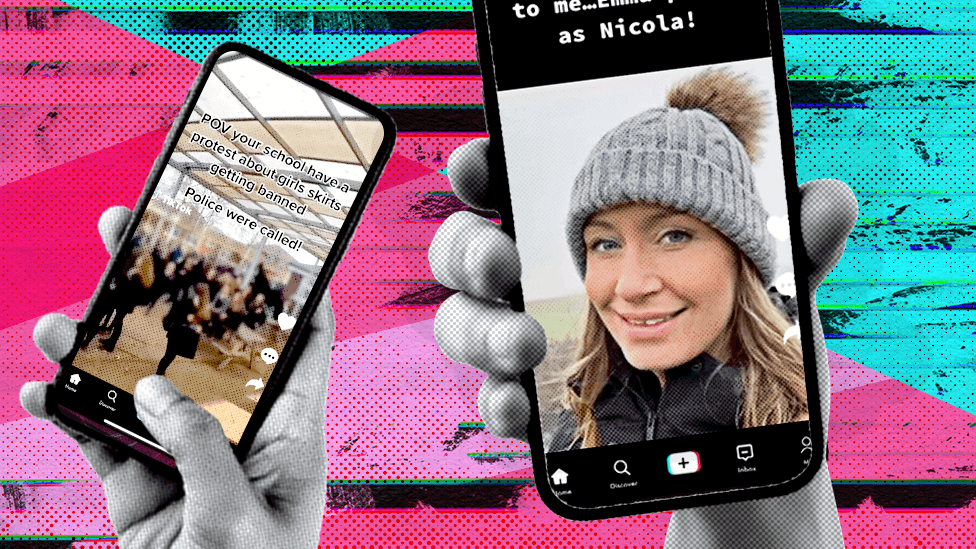Police leaders and teachers’ unions are warning that TikTok frenzies that encourage anti-social behaviour are putting a strain on public services.
It comes after the BBC revealed how disproportionate engagement driven by TikTok was linked to disruption.
The BBC found four recent examples, including public interference in the police investigation of Nicola Bulley’s disappearance and school vandalism.
TikTok says its algorithm prioritises safety while building communities.
The BBC’s investigation found that TikTok’s users are seeing videos which they wouldn’t normally be recommended – which, in turn, incentivise them to do unusual things in their own videos on the platform.
These frenzies – where TikTok drives disproportionate amounts of engagement to some topics – were evidenced by interviews with former staffers, users of the app and BBC analysis of wider social media data.
The two other examples the BBC investigated were outside the UK – an online obsession with the murder of four students in the US state of Idaho that led to innocent people being falsely accused, and the suggestion that TikTok fanned the flames of recent riots in France.
Chief Constable Pippa Mills, the National Police Chiefs’ Council Lead for Communications, says not all of TikTok’s effects are inherently negative – but the cases highlighted by the BBC investigation show TikTok “can lead to dangerous and sometimes criminal behaviour offline”.
“We’ve, upsettingly, seen additional and unnecessary pain and grief caused to victims and their families alongside detrimental impact on investigations,” she says.
“The effects of these behaviours on criminal investigations and the service to our communities should not be underestimated.”

The TikTok Effect
What connects amateur sleuths turning up at crime scenes, anti-social behaviour in UK schools and French riots? This film finds evidence that they are all examples of TikTok “frenzies”.
Watch on BBC iPlayer (UK Only)

The chairwoman of the Association of Police and Crime Commissioners (APCC) has also told the BBC she is “deeply concerned” by the added pressure that interference and anti-social behaviour by TikTok users puts on police.
Donna Jones called on the platform to take more responsibility for the impact of its design on its users.
She said: “The key difference here with TikTok in comparison to other social media platforms, as this investigation shows, is that their business model is based on active participation.”
‘Behaviour crisis’
Teachers’ unions have also expressed concern at how social media platforms were affecting behaviour amongst pupils.
Incidents often occur outside of school, but problems also tend to spill into school time, leaving teachers and leaders to deal with the fallout – says Geoff Barton, General Secretary of the Association of School and College Leaders (ASCL).
“Although schools are able to report social media misuse, they are essentially at the mercy of technology companies and their terms of service,” he adds.

The NASUWT has also raised concerns over how social media platforms are “contributing to a behaviour crisis in schools”.
The government needs to take stronger action to keep schools safe for “students, staff and the wider community”, says General Secretary, Dr Patrick Roach.
TikTok has previously distanced itself from outbreaks of disorder, such as the threatened looting of London’s Oxford Street last month, which politicians blamed on the billion-user app.
London’s Mayor Sadiq Khan reiterated his calls for social media companies including TikTok to “take more responsibility and clamp down on irresponsible and dangerous posts that incite violence and disorder”.
‘Starter for 10’
The BBC investigation was published in the same week a new law was passed in the UK parliament – the Online Safety Bill – aimed at making social media firms more responsible for users’ safety on their platforms.
The government said the BBC’s findings on TikTok frenzies highlighted “just how much it mattered” that it had taken “decisive action to prevent social media content from spiralling out of control and putting people at risk”.
Technology Secretary Michelle Donelan told the BBC the Bill would take “a common-sense approach to reining in the Wild West of social media”.
She explained: “It will mean that if social media platforms do not comply with their safety duties and tackle illegal content, they will face fines that could reach billions of pounds.”
Police and teachers representatives welcomed the new legislation but said it needed to go further.
The APCC’s Donna Jones described it as a “starter for 10” which needs “more revisions to ensure maximum protection for young people”.
Meanwhile, Geoff Barton from the ASCL said it was “a long way from seeing how effective it will be in practice”.
A spokesperson for TikTok told the BBC in a statement it recommends different types of content to interrupt repetitive patterns for users, removes “harmful misinformation” and reduces the reach of videos with unverified information.
It also told the BBC that users “naturally” took more of an interest in stories at “moments of national conversation, which are intensified by 24-hour news reporting”.
They also pointed out that the BBC has posted on TikTok about many stories like this.
